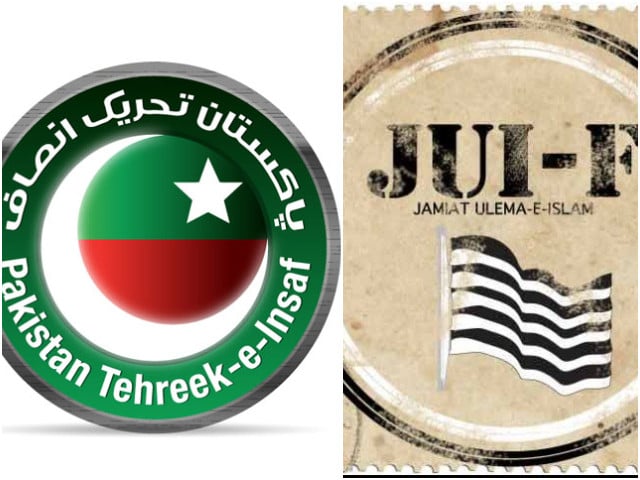ISLAMABAD:
The opposition’s push to shake up the political landscape is picking up steam with anti-government protests set to begin after Eid – but without JUI-F’s street muscle, PTI and its allies are left grasping for a united front.
Despite multiple rounds of talks, JUI-F chief Maulana Fazlur Rehman remains noncommittal, citing concerns over PTI’s leadership structure in the absence of jailed ex-premier Imran Khan.
As reported earlier, the Maulana has sought clear assurances on decision-making authority before backing the opposition movement.
With Imran in jail, he has also sought clarity on who will lead the opposition alliance and take key decisions once the movement is underway.
PTI leaders admit that limited access to their jailed leader has slowed negotiations and is delaying a final agreement. However, they remain hopeful that JUI-F will climb aboard the opposition alliance – Tehreek-e-Tahaffuz-e-Ayeen-e-Pakistan (TTAP) – soon after Eid.
Aware of JUI-F’s street muscle, PTI has been eager to secure Fazl’s backing, though the government is also working to keep him in its orbit, as seen in past legislative deals like the 26th Amendment.
Once the architect of Imran Khan’s ouster through a no-confidence motion, Fazl – once a key player in the then Pakistan Democratic Movement (PDM) – is wary of jumping into PTI’s boat without a firm anchor.
Insiders suggest that most issues between PTI and JUI-F have been ironed out, but the unresolved question of PTI’s leadership and negotiation authority remains a sticking point.
Fazl has reportedly insisted that any PTI representative negotiating on Imran’s behalf must have full decision-making powers – something PTI struggles to guarantee without Imran’s direct input.
The opposition alliance has been positioning itself for a major political showdown, as evidenced by its recent multi-party conference, where leaders from various parties called for constitutional supremacy, fresh elections and an end to the government’s crackdown on dissent.
Despite facing venue disruptions, the opposition managed to hold the conference, branding the current government illegitimate and demanding immediate electoral reforms.
Despite PTI’s repeated claims of launching street protests post-Eid, political experts argue that the movement’s fate hangs in the balance, with JUI-F’s formal inclusion being the deciding factor.
While PTI leaders see their alliance as a force strong enough to mirror past uprisings that toppled governments, Fazl’s hesitation has kept the opposition from reaching its full potential.
If a breakthrough is achieved, the political experts believe, the opposition’s post-Eid protests could escalate into a significant political challenge for the ruling coalition.
Though opposition parties have been gearing up for anti-government protests, their experiences in the recent past weren’t pleasant at all.
A glimpse of it was evident when the opposition parties tried to convene a two-day multi-party conference in the capital.
The hurdles to holding the opposition parties’ conference faced its first challenge even before the conference could kick off, as the organisers had alleged that the local administration of the twin cities didn’t allow them to hold the conference until the ICC Champions Trophy 2025 was over.
Despite obstacles throughout the conference, opposition leaders noted a silver lining: the government’s attempts to disrupt the event did not silence them entirely. The opposition alliance proceeded with its grand conference, with some opposition members scaling the gates while others forced their way into a local hotel after authorities had blocked the event.
The conference culminated with a declaration outlining a series of demands, including the supremacy of the constitution and the rule of law as the sole solution to Pakistan’s crises. TTAP leaders blamed the February 8 general elections, which they claim were rigged, for the prevailing political, economic and social turmoil.
They had further declared the current Parliament to be lacking moral, political and legal legitimacy. The other demands included the reversal of amendments allegedly deemed contrary to the Constitution, the immediate release of all political prisoners and the abolition of the Prevention of Electronic Crimes Act (PECA) amendments, which opposition leaders had argued were being used to stifle dissent.
The declaration had also stressed the urgent need to address grievances related to the distribution of water resources among provinces under the 1991 Water Accord, warning that failure to do so could exacerbate instability.
Opposition leaders had underscored that Pakistan’s recovery hinges on free, transparent and fair elections. They had also called for a unified national strategy to stabilize the country and committed to an ongoing struggle until their demands are met.
The opposition had vowed to continue its collective political efforts, asserting that only adherence to constitutional principles can steer Pakistan out of its current crisis.
With these demands and agenda, the opposition parties are all set to hold public rallies soon after Eid.
However, with JUI-F still hesitant and Jamaat-e-Islami yet to formally join the alliance, the key question remains: how united will the opposition stand against the ruling coalition, and what will they ultimately achieve?

